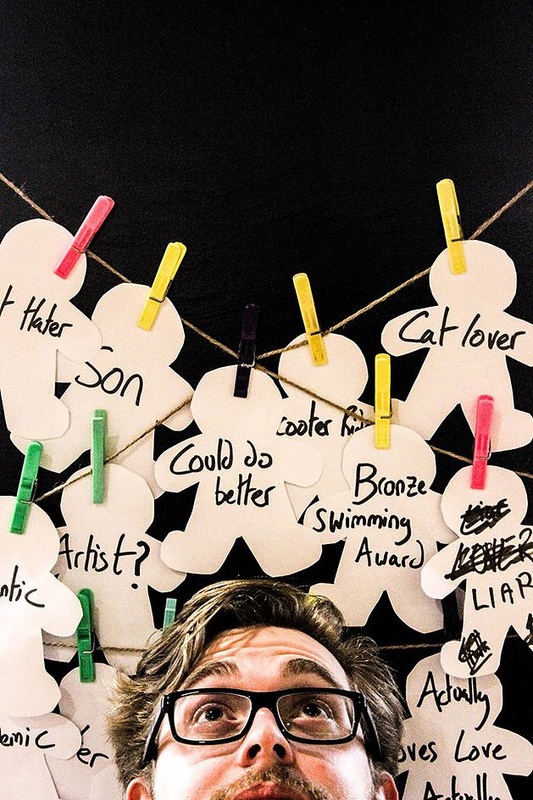Ben Wilson
Paper Chains and Black Holes doesn’t tell a story but simply exists as a platform for Clarke to ask questions, understand his past and prepare for his future. He talks of his past mistakes, current predicaments and hopes and fears for the future. There is no coherent narrative here but rather an invitation to share in his unknowing. There is always excitement and narrative dangers in diving into the ‘unknown’ with an audience, and Clarke hits both the excitement and the afore mentioned dangers, with a balance between the two that’s slightly off.
As a performer Clarke is very approachable, a necessary quality for any one-person showcase…especially one so deeply personal. When the show starts he talks at a great speed; a fault that means certain words are lost, but there is an enthusiasm and character with which he spouts his words that means our interest is rarely lost. Our first encounter with him consists of ramblings about frying pans, poached eggs and the universes energy, the thematic and narrative purpose of these ramblings is unclear to me and Clarke throws it off as simple ‘banter’. ‘Banter’ is flawed in any scripted scenario and this banter feels elongated and tedious. It does succeed, however, in allowing us to feel comfortable and close to Clarke; he quickly becomes a friend to everyone in the audience. This early sparked friendship with all of us lends itself to the entirety of the show to come; a show where we are forced to ask Clarke's self-evaluating questions of ourselves.
The most part of the show consists of Clarke discussing love in relation to how he sees himself. It would seem, although he talks of having MANY versions of himself, the version he is most concerned with is the part of him that feels and gives love. He talks of past love, failed love, Tinder adventures and Doctor Who as a romance reference point. His stories of experiencing various forms of love are funny, relatable and charming but lack a theatricality that earns them the right to be told on stage. He tells us his stories rather than shows them to us; this could be forgiven if it did not last the entire show.
That being said, halfway through the piece Clarke moves from playing himself as a self-deprecate to playing himself as a lonely, reflective fisherman sitting at seaside. He mixes new age and poetic existentialism brilliantly, swapping from Tinder to death without second guessing himself. As the fisherman he sits upstage over a pond of fish (a circle of blue tarpaulin with paper chains scattered) and talks of death and dreaming and “looking to the horizon”. His poeticism verges on pretension but is saved when it becomes interactive. Clarke speaks of the impossibility of accepting the ‘horizon’ until all past mistakes are absolved and he asks of the audience to tell him the things we regret, what we are sorry for. A moment of theatrical beauty follows that I am humbled to say I experienced. In, inevitable, fifteen second breaks of silence various members of the audience gave Clarke their regrets, he wrote them down on a paper chain and threw them to the oceans surge, a feeling of comfort amongst the audience knowing our apologizes were safe with Andrew and his fish pond, just as his are safe with us. He gives himself and us the horizon in that moment.
The set is especially simple, a blue tarpaulin, paper chains on an overhead wire and a chair for Clarke to sit himself on. One-handers, almost always, leave sets as simplistic as possible in order to keep the focus on the singular performer and their words. This works here just as it does with any other one-hander, we have nothing to take away from Clarke and his utterances.
The energy of the performance flows well and consistently, reliant on Clarke as a performer as well as a writer, the language being colloquial and self-depreciative and altogether charming. He makes us both comfortable and intrigued as he asks and pulls apart some of life’s age-old questions and forces us to do the same. Although it takes a while for the heart and poetic finesse of Clarkes’ Paper Chains and Black Holes to truly fly, when it does, it is an immersive, honest, theatrical creation to behold. It is a true disappointment that, at the end of the show, Clarke reveals his moving on from our city. I would love to see what he comes up with next.






